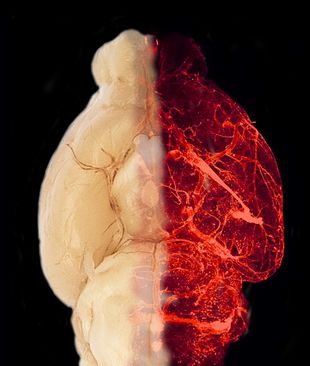Researchers have shown for the first time the role of astrocytes in the hypothalamus in obesity-related hypertension and how the hormone leptin is involved in the increase of blood vessels in the hypothalamus of obese mice. The study was published in Nature Metabolism.
Pathologies of the micro- and macrovascular systems are a hallmark of the metabolic syndrome, which can lead to chronically elevated blood pressure. However, the underlying pathomechanisms involved still need to be clarified. Researchers have now shown for the first time that an obesity-associated increases in serum leptin triggers the select expansion of the micro-angioarchitecture in pre-autonomic brain centers that regulate hemodynamic homeostasis.
Once the researchers increased the hormone leptin in these mice, certain brain cells, the astrocytes, boosted the production of a specific growth factor. This growth factor, in turn, promoted vessel growth. The result was an increased number of vessels in the hypothalamus (and no other brain region).
When the researchers increased leptin levels, certain brain cells, astrocytes, boosted the production of a specific growth factor. This growth factor, in turn, promoted vessel growth. The result was an increased number of vessels in the hypothalamus (and no other brain region). The scientists thus demonstrated that leptin is mainly responsible for the increased concentration of vessels in the hypothalamus and that this process is mediated via astrocytes.
The study was led by Helmholtz Zentrum München, and researchers from Ludwig-Maximilians-Universität, Technische Universität München and the German Diabetes Center were also involved.
Original publication:
Gruber et al., 2021: Obesity-associated hyperleptinemia alters the gliovascular interface of the hypothalamus to promote hypertension. Nature Metabolism, DOI: 10.1016/j.cmet.2021.04.007
Highlight-Artikel in Nature Reviews Endocrinology: https://www.nature.com/articles/s41574-021-00511-3

